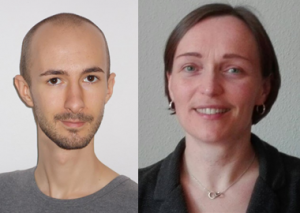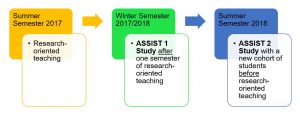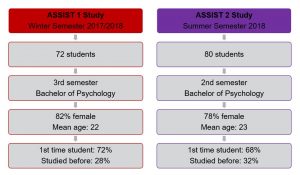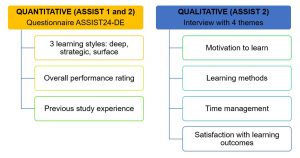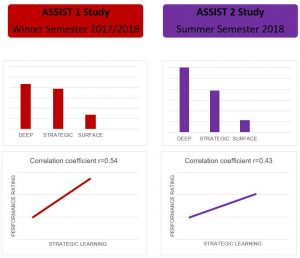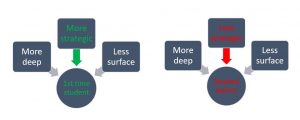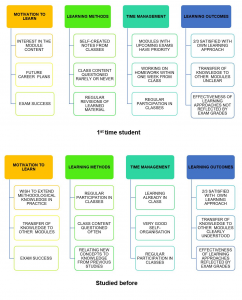von Dominik Grudzien und Karina De Santis
Two studies were conducted to explore the learning approaches depending on the previous experience with studying (1st time student vs. studied before) in two different cohorts of Bachelor of Psychology students at the University of Bremen. The responses from 152 students suggest that they prefer the deep and the strategic learning approaches over surface learning. However, learning approaches depend on experience with studying according to the interviews with six students. The 1st time students report difficulties with relating the material to other modules and tend to learn strategically for assessment and future career. In contrast, the students who have studied before wish to gain more practical skills, learn by reflecting and connecting the new concepts with their previous knowledge, and manage their time effectively by starting to learn already in class. University instructors may need to consider such potential differences in learning approaches by utilising teaching methods that improve the satisfaction with learning in all students regardless of their previous experience with studying.
From music to psychology (Dominik Grudzien)
I came to Germany in 2012 directly after completing my A-level exams in Poland. My aim was to obtain a degree in classical music and to become an orchestra musician or freelance instrumentalist. I was lucky because after my entrance examinations I was chosen from a large group of candidates for one of two available study places in a flute class at the Music Department of the University of Arts Bremen.
During my studies I spent many hours every day on practicing my technical skills and I became aware of my stronger and weaker sides of a stage performance. An important event occurred in my 4th semester of studies. I completed a course called Bühnenpräsenz/Auftrittstraining (Stage Presence/Performance Training). This course helped me to improve my performance on various dimensions, including those hidden inside the performer and unnoticeable to the audience. Importantly, the course inspired me to study psychology after graduating with my Bachelor of Music degree. What I wanted was to better understand the psychological side of stage performance and to be able to help others in achieving their goals in music and in other areas of life.
Directly after getting my Bachelor of Music degree I enrolled in the Bachelor of Psychology program at the University of Bremen. Based on the stereotypes about psychology I expected to study the human mind (both in classes and at parties). The first awakening came already during the Orientation Week in the form of a detailed study plan that included statistics, research methods, and modules on biological bases of behaviour. The first semester was filled with lots of different classes with hundreds of power point slides to memorise and also four key questions that formed in my mind:
- What is relevant for the exam?
- What is really needed for my future career in psychology?
- How to get the best grades?
- How to keep all these facts in my memory long-term?
My learning approach was to rewrite all the content from the provided slides and hope that I will remember it at least until exams. Luckily, I passed all my exams but my satisfaction with learning remained low.
One of the milestones in reconsidering my choice of learning strategies was the Research Methods module with Professor De Santis in the summer semester 2017. The module was special due to the research-oriented teaching method that required us to understand and critically think about the material. This was achieved by discussing the content in class and solving different tasks to try out the newly learned concepts in practice. I was surprised to see the long lasting effects of this method while doing some revisions during the summer break. I realised that there are other learning approaches, than the one I used in my first semester, and that they can result in better learning outcomes. That inspired me to search for the answer to a new question: How do other students learn? It was a pure coincidence that after the summer break Professor De Santis invited my cohort to participate in a study on learning approaches (ASSIST 1 Study; see below). Since I was interested in the topic Professor De Santis suggested that I could conduct another study on the learning approaches (ASSIST 2 Study; see below) for the purposes of my internship. The aim of this article is to describe the learning approaches reported by students in the Bachelor of Psychology program at the University of Bremen based on the results of both studies.
Studies on learning approaches (Karina De Santis)
In the Winter Semester 2017/2018 we conducted the ASSIST 1 Study to investigate the learning approaches used by the students enrolled in the Research Methods module in the Bachelor of Psychology program at the University of Bremen (De Santis, 2018; Seehoff et al., 2018). The students reported that they mainly use the deep and the strategic approaches to learning. These results appeared to depend on age: the deep learning was more common among the older students (22 years or older) while the strategic learning was more common among the younger students (21 years or younger). Furthermore, the strategic learners were more satisfied with own performance in the module.
While the ASSIST 1 Study showed us the preferred learning approaches of our students, it did not explain in detail how students learn, what motivates them to learn, and if they are satisfied with their learning outcomes. Therefore, in the Summer Semester 2018 Dominik and I conducted another study (ASSIST 2 Study) to attempt to find out how students learn in more detail. The timeline of both studies is shown in Figure 1.
Based on the results of the ASSIST 1 Study we speculated that the learning approaches may depend on the teaching style because the study took place after one semester of research-oriented teaching (Figure 1; De Santis, 2018). Furthermore, we also suspected that learning depends on the previous experience with studying rather than age alone (De Santis, 2018). Therefore, the overall goal of the ASSIST 2 Study was to replicate the ASSIST 1 Study in a new cohort of students focusing on the following aims:
- to investigate the learning approaches before experiencing the research-oriented teaching style,
- to investigate the learning approaches depending on the previous experience with studying in the higher education,
- to investigate the learning approaches in depth using qualitative interviews with a small group of selected students.
The characteristics of participants in both studies are summarised in Figure 2.
The participants in both studies were mostly young, female students in two different cohorts of the Bachelor of Psychology program at the University of Bremen. Interestingly, about 30% of participants reported that they have already studied in the higher education before starting their psychology degrees (Figure 2).
The procedures in both studies are summarised in Figure 3.
Both studies utilised the Approaches and Study Skills Inventory for Students (ASSIST24-DE) with 24 questions in German (Figure 3). The questions measure to what extend students use the following three learning approaches on a scale from 1 (strongly disagree) to 5 (strongly agree):
- ‘deep approach’ means learning by relating ideas and understanding the evidence,
- ‘strategic approach’ means learning focused on achievement,
- ‘surface approach’ means learning by memorising facts with little understanding and being motivated by the fear of failure (De Santis, 2018).
In addition to the ASSIST24-DE questionnaire, six students in the ASSIST 2 Study participated in the qualitative interviews (conducted by Dominik) designed to investigate their learning approaches in more depth (Figure 3).
Learning approaches are mostly deep and strategic (Karina De Santis)
The results of both studies are summarised in Figure 4.
The participants in both studies reported using predominantly the deep and the strategic learning approaches rather than the surface learning approach (Figure 4). Therefore, we have directly replicated the results of the ASSIST 1 Study in a new cohort of students in the ASSIST 2 Study. These results are interesting considering the different timing of data collection in both studies: before (ASSIST 2) and after (ASSIST 1) experiencing the research-oriented teaching. Therefore, teaching methods alone cannot be responsible for the choice of the learning approaches by the students. In general, it appears that our bachelor students aim to understand the material deeply. Therefore, teaching and assessment methods need to be appropriately structured to promote such learning approaches (De Santis, 2018).
Furthermore, strategic learning was related to higher ratings of own performance in both studies, suggesting that the strategic learners were presumably more satisfied with their academic performance (Figure 4). This is not surprising because strategic learning is mostly focused on achievement. The strategic learners may be particularly successful academically due to their good time management and organisational skills.
Learning approaches and study experience (Karina De Santis)
Our results from the ASSIST 1 Study suggest that strategic learning is particularly common in the younger students (De Santis, 2018; Seehoff et al., 2018). In the ASSIST 2 Study we investigated the effects of study experience (rather than age alone) on the learning approaches. As shown in Figure 5, the 1st time students tend to use more strategic learning approaches relative to the students who have already studied before their psychology degree. Since age and having studied before are positively related, it appears that the experience with studying in the higher education rather than age alone influences the choice of the learning approaches.
Learning approaches according to qualitative interviews (Dominik Grudzien)
In ASSIST 2 Study we conducted six interviews: three with the 1st time students and further three with the students who have already studied before. The main themes discussed by the students are summarised in Figure 6.
In line with the quantitative results (Figure 5), there were some differences in how students learn based on their previous study experience (Figure 6):
- Motivation to learn. Although both groups learn for exam success, the 1st time students tend to be motivated by the interest in the module content and strategic reasons related to the future career plans. In contrast, the students who have studied before are motivated to learn deeply by extending their practical skills and transferring knowledge among modules.
- Learning methods. The 1st time students rarely question the material and learn using self-created notes from classes that are used for later revisions. In contrast, the students who have studied before tend to question the class content, learn already in class, and try to relate the new concepts to the knowledge gained in their previous studies.
- Time management. Both groups reported that regular participation in classes helps with their time management. However, the 1st time students manage their time based on the upcoming assessment, while those who have studied before try to already learn in class and be well organised due to work or family commitments.
- Learning outcomes. Although most students in both groups are satisfied with own learning approach, the 1st time students report difficulties with transferring knowledge and question the effectiveness of their learning. In contrast, the students who have studied before are able to relate content to other modules and report that their grades reflect the effectiveness of their learning.
Conclusion (Dominik Grudzien/Karina De Santis)
Both of our studies suggest that psychology students prefer the deep and the strategic learning approaches over surface learning. However, successful learning requires seeing the big picture. Therefore, the students studying for the first time may need more guidance to learn how to relate their knowledge to other modules. The students who have studied before may profit from such experience by focusing on already proven learning approaches depending on the study field. Such students wish to extend their practical knowledge, report better time management skills, and learn already during classes. While the current results are based on the opinions of a small group of psychology students, it is likely that students in other programs also use different learning approaches depending on their previous experience with studying. Although learning depends on more factors than the teaching methods or the previous experience with studying, the instructors need to assist students with choosing of effective approaches to improve their satisfaction with learning on the whole.
Bibliography
- De Santis (Kedzior), K. K. (2018). Learning approaches in the Research Methods module in psychology. Resonanz: Magazin für Lehre und Studium an der Universität Bremen, SoSe2018, 16-21.
- Seehoff, H., Gerkensmeier, I., & Kedzior, K. K. (2018). Empirical assessment of approaches to learning methods in psychology [Poster]. Learning Through Inquiry in Higher Education: Current Research and Future Challenges (INHERE 2018), München.
Acknowledgements
We would like to thank the students in the Research Methods module in psychology (Summer Semester 2018) for participation and assistance with development of the interview questions for this study.
Author information
Dominik Grudzien is a BSc Psychology student (5th semester) who participated in the ASSIST 1 Study and conducted the ASSIST 2 Study for the purposes of his internship in psychology with Professor De Santis.
Prof. Dr. Karina De Santis is Vertretungsprofessorin in Research Methods in Psychology (FB11) at the University of Bremen. She is a neuroscientist (publishing as Karina Kedzior) interested in the use of non-invasive brain stimulation methods in psychiatric disorders (see: https://www.researchgate.net/profile/Karina_Karolina_Kedzior). She has been teaching research methods and statistics for 12 years and contributed to various studies on factors affecting learning in higher education, including research-oriented teaching and intercultural competence.
Picture credits
- Figures 1-6 and photos: Dominik Grudzien; Karina De Santis

